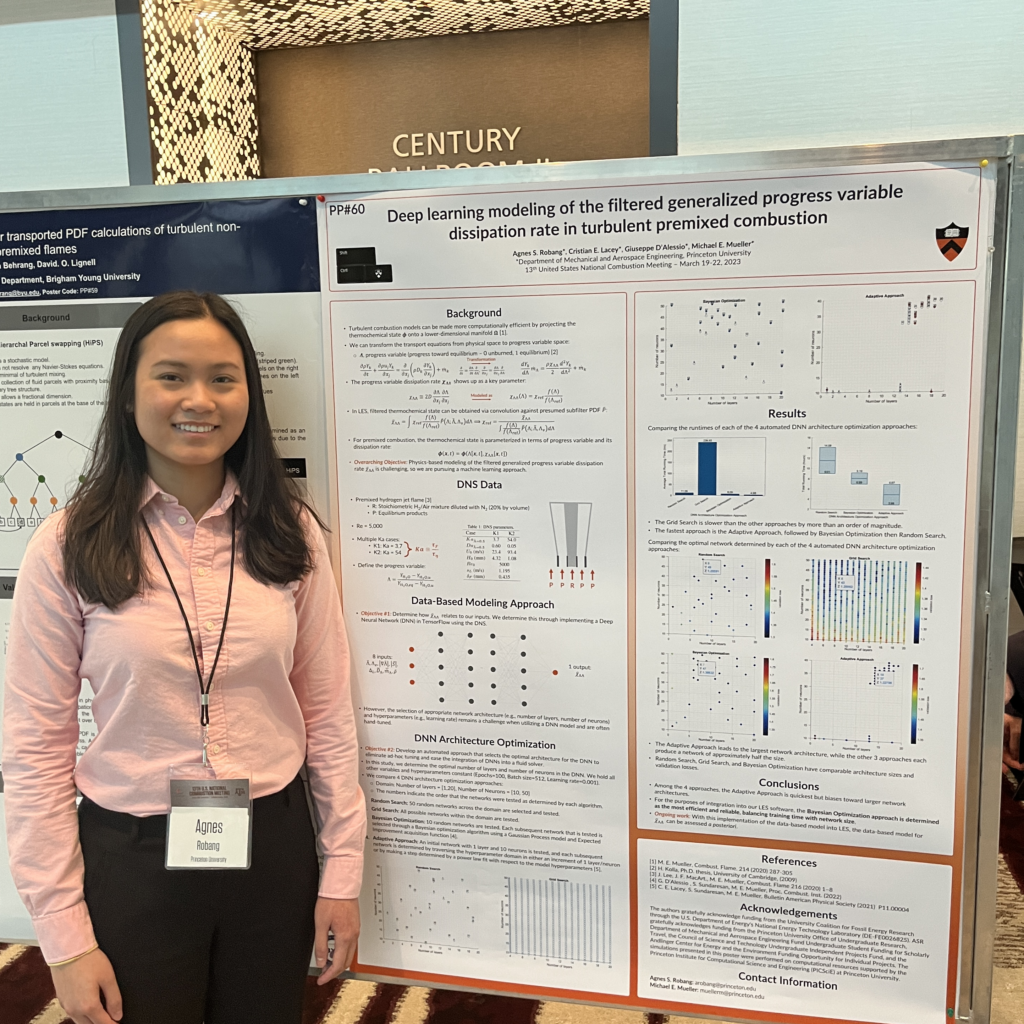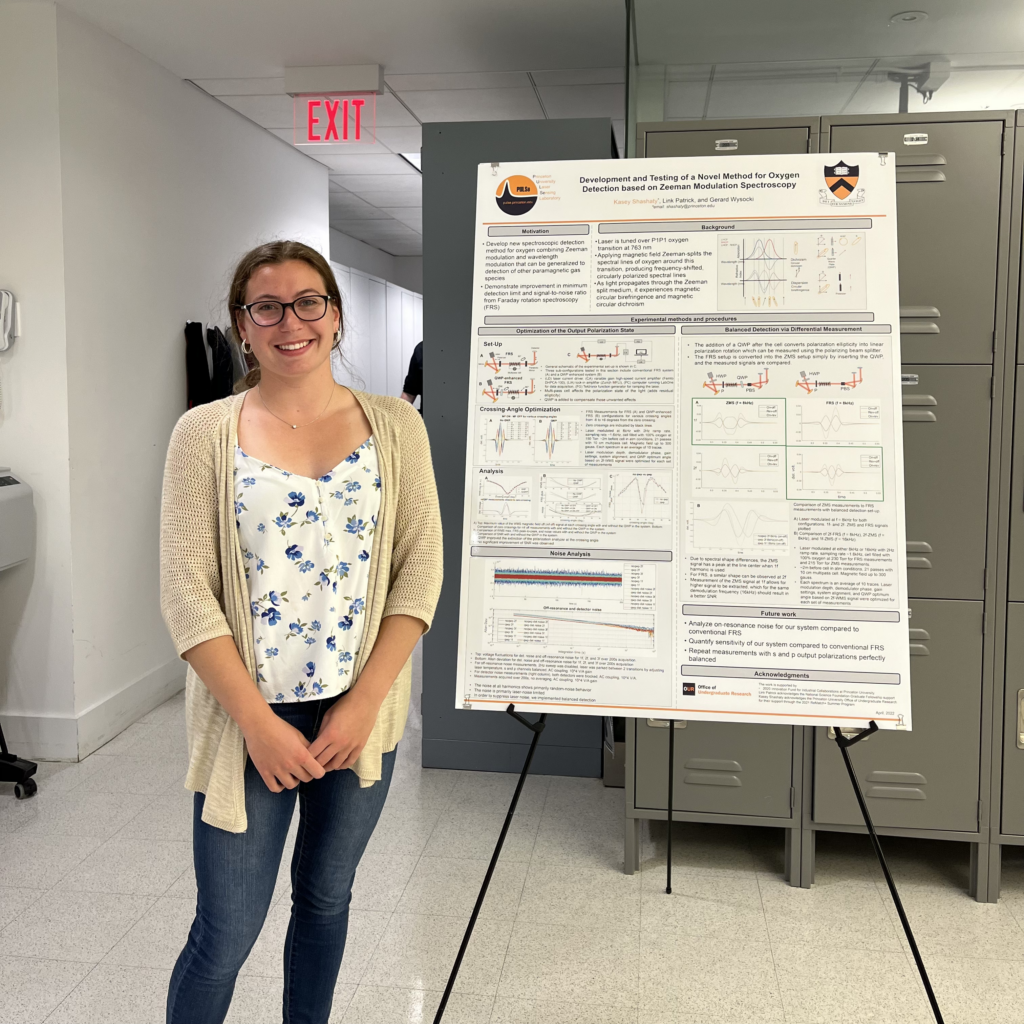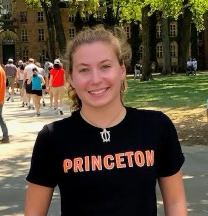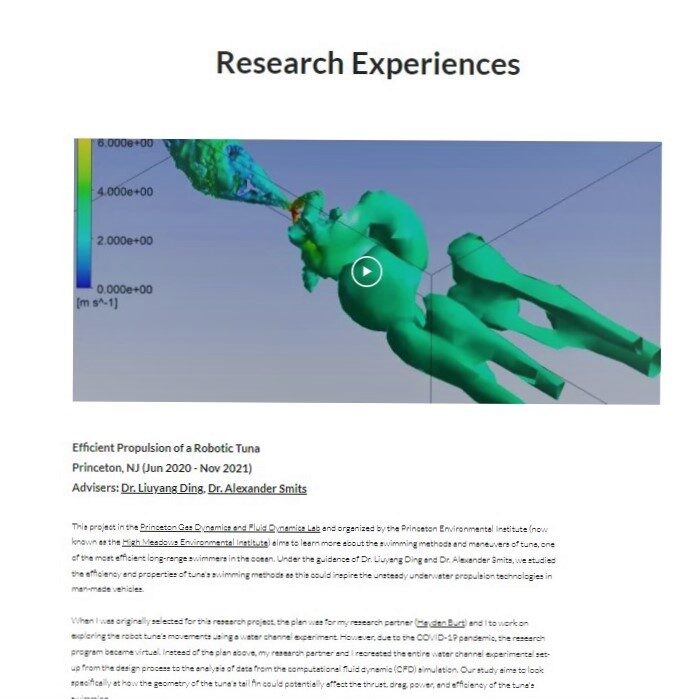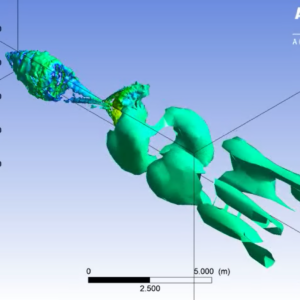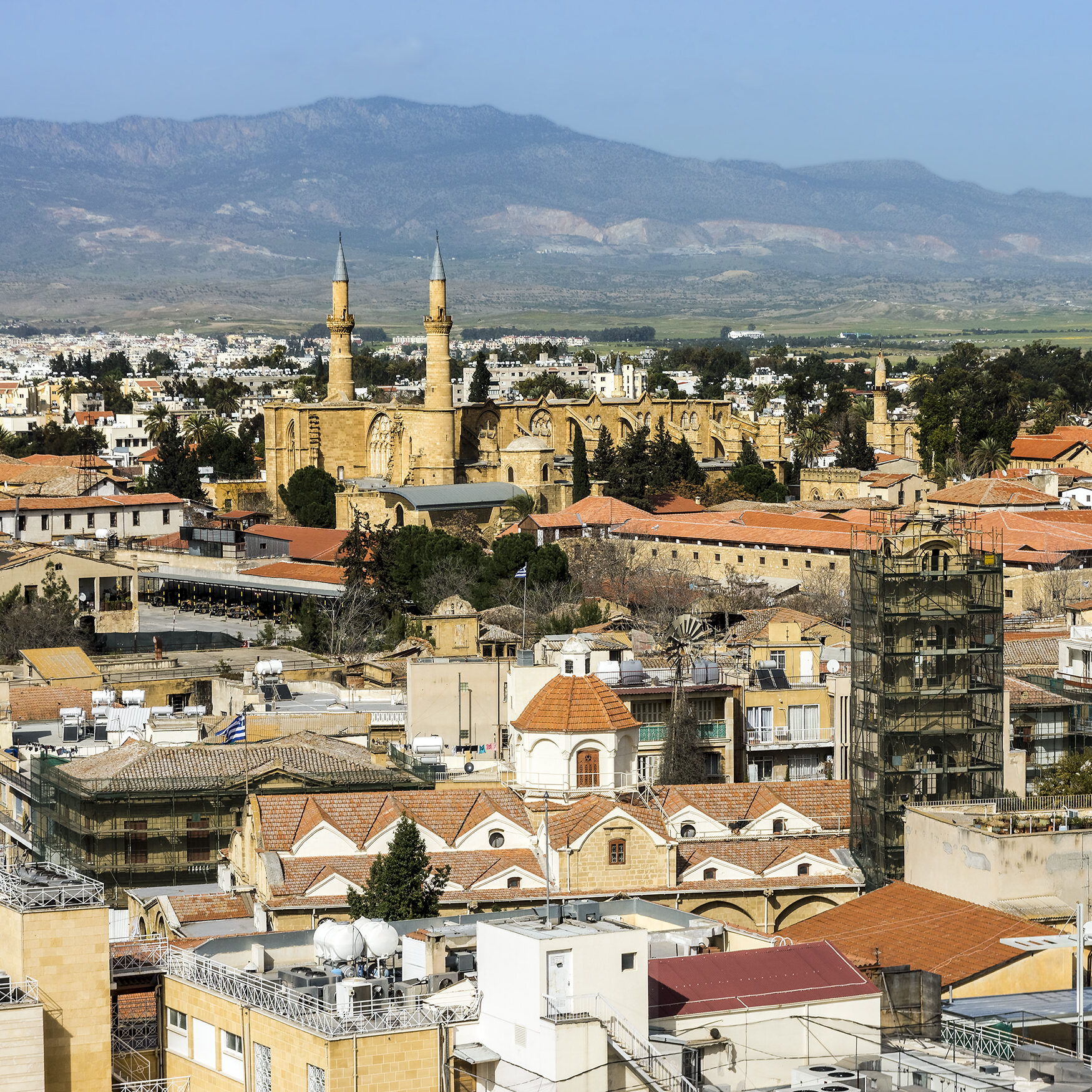The Princeton Perspective Project (PPP) is an initiative by Princeton students against the expectation of “effortless perfection.” Our seasonal series in partnership with PPP interviewed professors, undergraduate students, and graduate students to hear their thoughts on expectations, challenges, failures, and growth through it all. In this segment of our Seasonal Series, we hear from Cara Khalifeh, the Treasurer of the Princeton Perspective Project.
Continue reading An Interview with Cara Khalifeh, PPP TreasurerMy Experience at the 13th U.S. National Combustion Meeting
From March 19 to 22, 2023, I was at the 13th U.S. National Combustion Meeting presenting a research poster. My work was titled, “Deep Learning Modeling of the Filtered Generalized Progress Variable Dissipation Rate in Turbulent Premixed Combustion”. In my junior year, as I was planning what to work on for my thesis and what goals I hoped to attain, I determined that I wanted to go the extra mile in my research, enough to be able to go to an academic conference. With some hard work, the patient guidance of my adviser Prof. Michael Mueller, the support from my labmates at the Computational Turbulent Reacting Flow Lab, and the funding from several sources (MAE, CST, OUR, and ACEE), I was able to attend this conference! This was my first research conference, and I cannot overstate how valuable this experience has been to my growth as a researcher.
Continue reading My Experience at the 13th U.S. National Combustion MeetingA Letter to the Juniors on the Senior Thesis
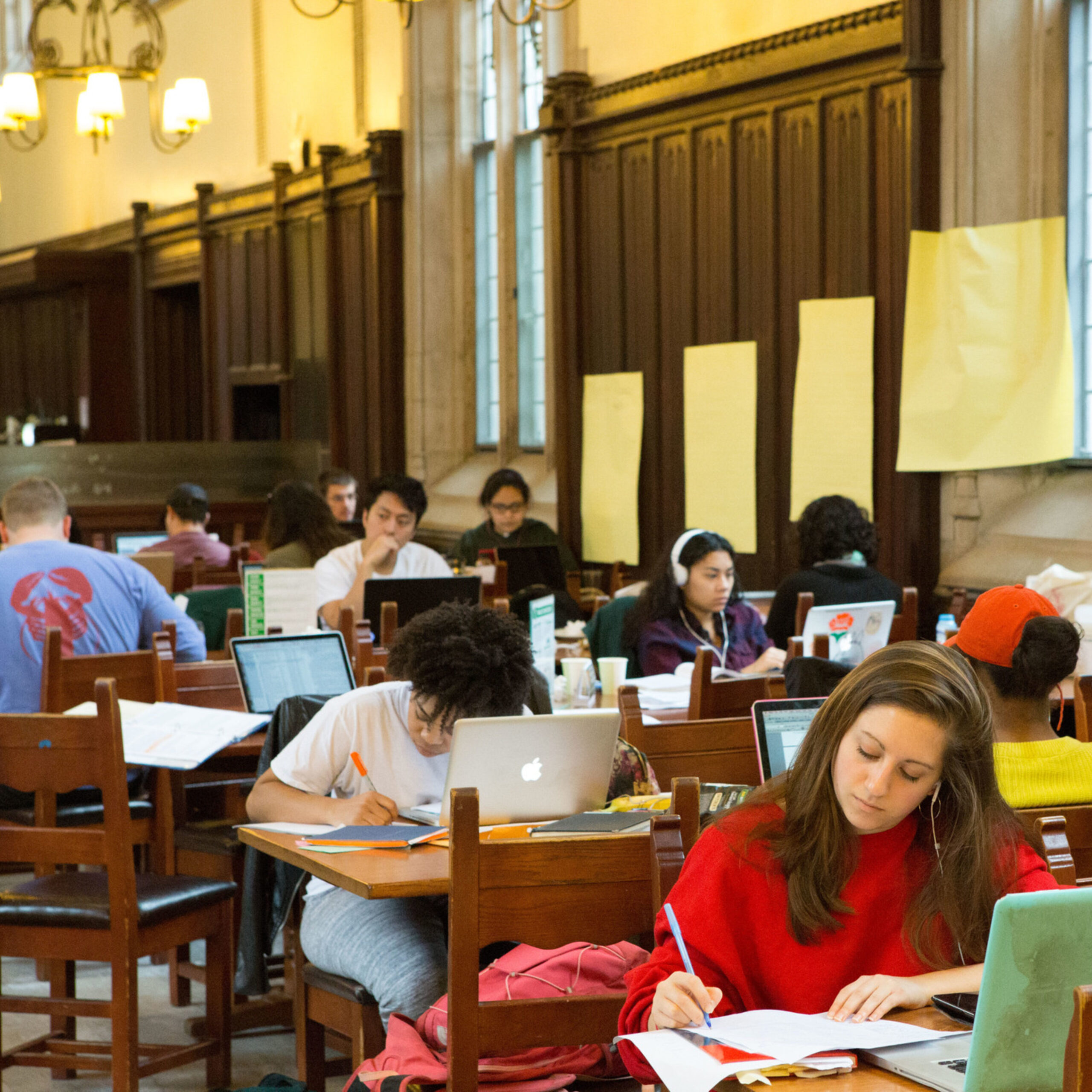
Hello juniors!
Spring is always a rollercoaster of a semester. We have just about 6 more weeks of school before spring classes are over! Before you know it, you will be a senior and will have to start thinking about the big T – thesis. I recommend you take a little bit of time to think about your thesis – maybe you’ve already started after reading Ryan’s great post around choosing a topic. You don’t have to have all of the answers right away, but at least you would already have given it a bit of thought and let your ideas brew at the back of your mind.
Continue reading A Letter to the Juniors on the Senior ThesisExperiences in the ReMatch+ Program: An Interview with Kasey Shashaty ’23 – Part 2
Last spring, I interviewed Kasey Shashaty. In this second part of my interview, we discuss specific challenges in her transition between virtual and in-person research and reflections on how this experience in the PULSe Lab has influenced her perspective on research and her plans for the future.
Kasey Shashaty got her jumpstart in research through the ReMatch+ program organized by the Office of Undergraduate Research. ReMatch+ is a summer mentorship program that pairs first-year and second-year students with a graduate student or postdoctoral fellow as they work on a summer research project. Read on to learn more about her research experience!
Continue reading Experiences in the ReMatch+ Program: An Interview with Kasey Shashaty ’23 – Part 2Experiences in the ReMatch+ Program: An Interview with Kasey Shashaty ’23 – Part 1
Kasey Shashaty is a junior majoring in Electrical and Computer Engineering. She began working at the PULSe (Princeton University Laser Sensing) Lab in the summer of 2021 and has been working with them since. In this interview, Kasey and I discuss how she got involved in this lab through the ReMatch+ program, her experiences working in the lab both virtually and in-person, and where she is taking her experiences in the future.
Continue reading Experiences in the ReMatch+ Program: An Interview with Kasey Shashaty ’23 – Part 1Lessons from Junior Independent Work in MAE
In the fall of 2021, I worked in the Computational Turbulent Reacting Flow Laboratory under the guidance of Professor Michael Mueller. In the Mechanical and Aerospace Engineering (MAE) department, junior independent research is optional. I enrolled in MAE339: Junior Independent Work in the fall and am currently continuing my research this spring semester. Research was an integral part of my high school experience, and I was excited to start working on independent research in my junior year of college in a different setting. Now, I want to share a few of the lessons I learned from this past semester with you:
Now is the perfect time to build your personal portfolio!
Have you ever left an interview wishing you remembered to mention that project you did in class? Or do you have a broad range of interests and experiences that do not fit on a one-page resume? Have you ever built something really cool and wanted to show everybody but were not sure how? You can answer all of these issues with your own personal portfolio.
A portfolio is similar to a resume in that it showcases your work and achievements, but it is more flexible in that it can take different forms and include all types of media. It can be helpful to share with recruiters and interviewers during your career search, and you can ensure recruiters come across it by sharing a link to it in your resume! It is probably the most underrated career search material, and taking the time to craft your own portfolio is already a huge step to making yourself stand out.
Continue reading Now is the perfect time to build your personal portfolio!Jumping In and Out of Virtual Research
When I entered my sophomore year in the fall of 2019, I was determined to get more hands-on engineering experience. I applied for a High Meadows Environmental Institute Internship to do research on a robotic tuna at the Princeton Gas Dynamics and Fluid Dynamics Lab. I was fortunate enough to have been accepted to the internship, and I spent the early part of 2020 getting ready to work under the tutelage of Professor Alexander Smits and postdoctoral scholar Dr. Liuyang Ding. The project was to conduct an experiment where we would measure the generated thrust force, power, and efficiency of a robotic tuna.
Continue reading Jumping In and Out of Virtual ResearchMy Virtual Global Seminar Experience: Jumping in Foreign Water
In the summer of 2021, I participated in a virtual global seminar in Cyprus entitled Conflict, Borders, Multilingualism, Translation. I was particularly drawn to the idea of learning about Cyprus’ history and culture through the lens of multilingualism and translation. Personally, language has always played a key role in my understanding of identity and culture. Three languages are spoken in my home (Filipino, English, and Chinese Hokkien), and growing up in this way has made me very conscious of language-culture influences, code-switching, and nuances in connotation.
Applying to this global seminar was a spontaneous decision; I major in MAE and am more used to spending my summers doing research and technology. However, when I read about this seminar in an email, I knew that it aligned with my personal interests in the social sciences. Because of the great time I had during the seminar, I am writing to motivate people to take advantage of the breadth of courses offered by Princeton and try studying something totally spontaneous and new!
Continue reading My Virtual Global Seminar Experience: Jumping in Foreign WaterAn Interview with Bhadrajee Hewage ’20, South Asian Studies Graduate Student and Researcher
Bhadrajee Hewage is an accomplished researcher in the humanities – he has conducted research in 5 continents, can speak 12 languages, and has published articles in several magazines and journals as well as his own book on Ceylonese Buddhist revivalism (with a second book on the way)! Bhadrajee graduated Phi Beta Kappa from Princeton in 2020 having majored in History and obtained certificates in South Asian Studies, African Studies, and Latin American Studies. I met Bhadrajee through the Davis International Center where he served as Leader Coordinator. From our first few conversations, I was immediately awestruck with the breadth of research he’s done, and this is why I chose to interview him. His published works range from the early history of Rome and Tanzanian political history to the U.S. Civil War.
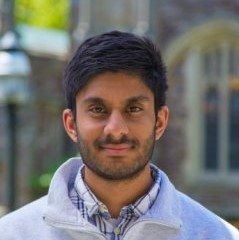
He is currently a DPhil Clarendon Scholar at the University of Oxford and recently obtained his degree as the Prize Research MPhil Student at the Joint Centre for History and Economics at the University of Cambridge. Broadly, his research interests lie at the intersection of colonial, religious, and intellectual history.
Continue reading An Interview with Bhadrajee Hewage ’20, South Asian Studies Graduate Student and Researcher


